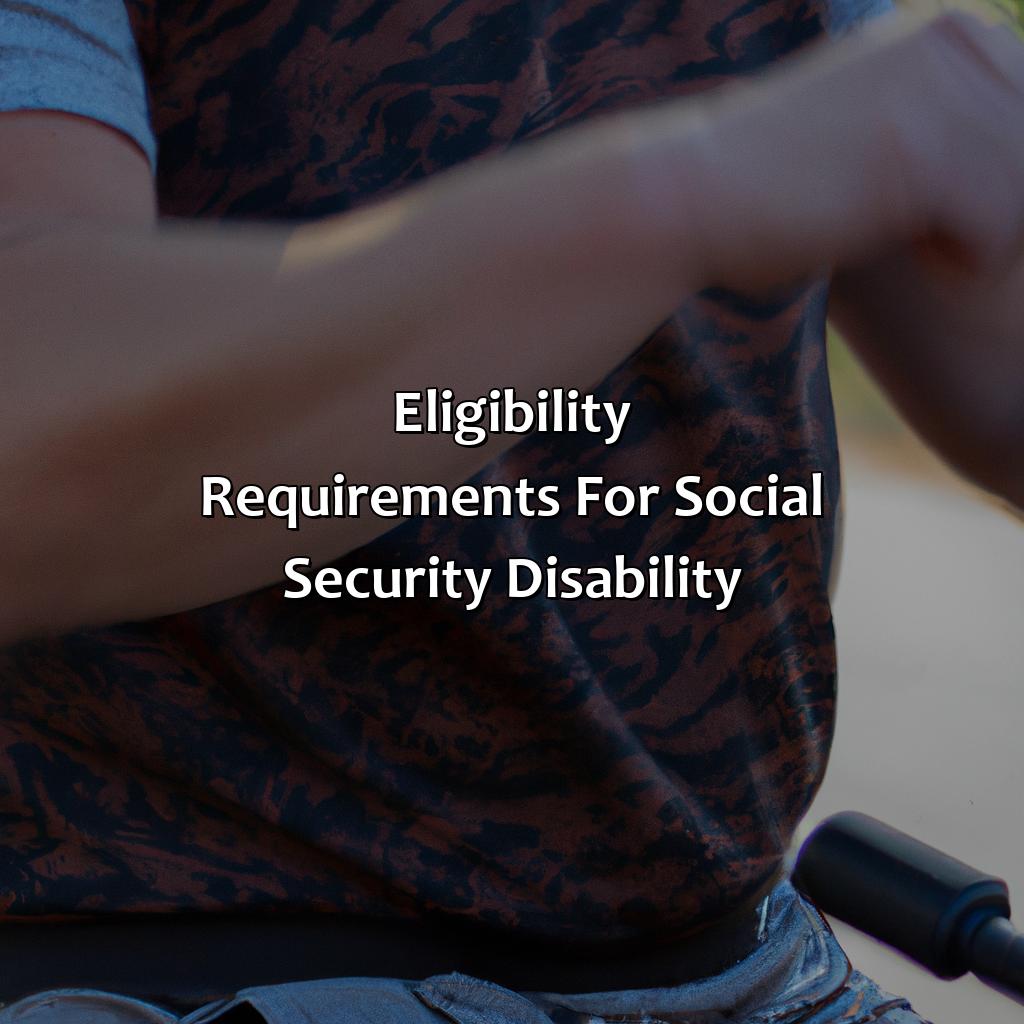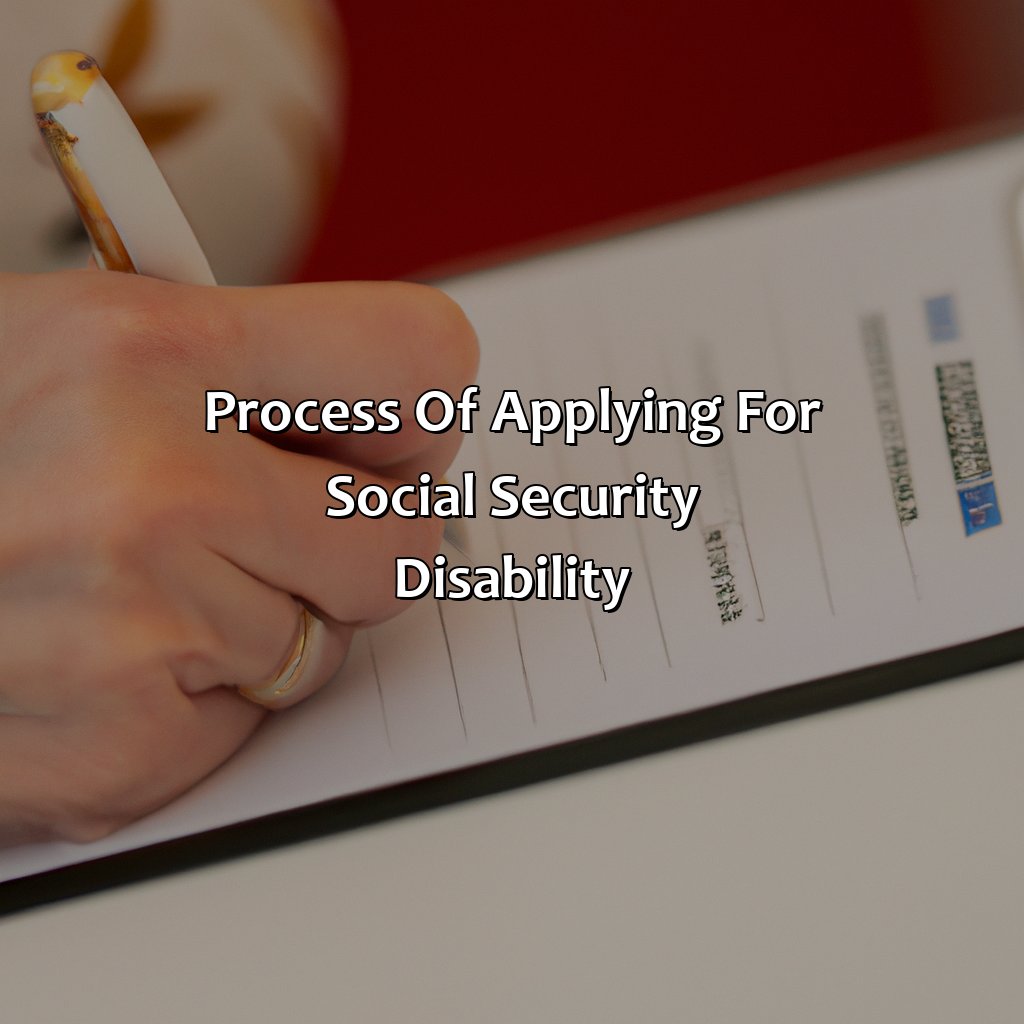How Hard Is It To Get Social Security Disability?
Key Takeaway:
- Obtaining Social Security Disability can be a difficult and lengthy process: It requires meeting both medical and non-medical eligibility requirements, gathering required documentation, and submitting the application. Additionally, there is a waiting period for approval and potential appeals process.
- Meeting the medical eligibility criteria is crucial: Applicants must have a medical condition that prevents them from engaging in substantial gainful activity and is expected to last at least 12 months. The condition must also be severe enough to significantly limit their ability to perform basic work-related activities.
- Non-medical eligibility criteria may include work history and income: Applicants must have earned enough work credits and meet certain income limits to qualify for Social Security Disability. Those who do not meet these requirements may still be eligible for Supplemental Security Income, a program for those with limited income and resources.
Feeling overwhelmed and uncertain about applying for social security disability? You’re not alone. With approval rates varying greatly, navigating the process may seem daunting. But understanding the requirements can help you get the security you need.
Eligibility Requirements for Social Security Disability
Are you eligible for social security disability? To figure out, you must meet certain conditions. Here’s a breakdown of the medical and non-medical requirements you need to qualify.

Image credits: retiregenz.com by James Arnold
Medical Eligibility Criteria
Getting Social Security Disability requires meeting the medical eligibility criteria to prove that your condition meets the severity level described in the SSA Blue Book. This includes providing extensive medical records and undergoing various exams, such as mental health evaluations and specialist consultations. This process can be challenging, but having a reliable attorney to guide you through the complicated applications process can help increase your chances of approval.
To meet the medical eligibility criteria, you must have a severe impairment that interferes with daily activities and lasts for at least 12 months or until death. The impairment must be listed in the SSA Blue Book, which contains descriptions of common conditions that qualify for disability benefits. If your condition is not listed, you may need to prove that it is equivalent or equally severe to a listed condition.
Additionally, certain legal criteria must also be met, such as paying Social Security payroll taxes and earning enough credits throughout your working life.
To increase your chances of approval, consider gathering comprehensive medical records before applying and working with an experienced attorney who understands how to navigate the intricate layers of Social Security Disability regulations. By presenting strong evidence and following necessary steps, you can increase your likelihood of receiving much-needed financial assistance during difficult times caused by serious disabilities.
Sorry, being lazy or having a personality disorder won’t cut it for Social Security Disability – you actually have to meet non-medical eligibility criteria.
Non-Medical Eligibility Criteria
To qualify for Social Security Disability benefits, applicants must meet various eligibility criteria aside from the medical aspects. These non-medical requirements vary based on a claimant’s work history and age. Work credits are necessary to qualify for SSDI benefits, which require ten years of employment (or twenty spending on the claimant’s age). Age considerations apply to SSI applicants; they must typically be sixty-five or older or living with a disability. In some instances, certain family members of eligible candidates can obtain auxiliary benefits.
It is essential to note that these non-medical eligibility criteria follow strict guidelines set forth by the Social Security Administration. These rules exist to ensure that only those entitled to receive benefits receive them without improper vetting and approval processes subject to abuse.
It is an unavoidable fact that many people go through tremendous stress attempting to navigate the complex world of social security disability eligibility criteria. Denise, a single mother, lost her life savings in attempting to secure enough evidence through several appeals before eventually winning five years after her initial application was denied.
Why climb Mount Everest when you can experience a similarly frustrating and exhausting process by applying for social security disability?
Process of Applying for Social Security Disability
Getting social security disability requires key documents and an application. We will look into the process now. The article will explain what you should know about the different parts of the process. So, let us dive in and explore the details!

Image credits: retiregenz.com by Harry Jones
Gathering Required Documentation
When it comes to initiating your application for social security disability, preparing the mandatory documents is imperative. Collating your medical records, tax returns and W-2 forms could significantly speed up the application review process.
Ensure to provide all medical records including hospitalization details and any mental health documentation dating back to the time of your disability that will prove useful during the assessment. Medical professional statements regarding treatment schedules and suggested treatments are also beneficial.
An essential set of distinctive details required are those relating to work-status reports from former/current employers where you’ve received benefits due to injury/illness while at work. This additional information tailored with your previous income history could improve your eligibility for ample assistance.
According to published data by the Social Security Administration, approximately 30% of disability applications submitted get approved initially.
Submitting the application for social security disability is like entering a lottery, but the prize is just a monthly allowance to survive.
Submitting the Application
The journey to receiving social security disability can be a long and arduous process. But don’t let that discourage you. Below are five steps that will make submitting your application much more manageable.
- First, gather all supporting documentation to submit with your application, including medical records, work history, and other relevant information.
- Next, fill out all required paperwork carefully and accurately applying for social security disability. Any mistakes or missing information could delay or deny approval.
- After completing the application, submit it via mail or online through the SSA website.
- Once the application is reviewed, you may be called for additional interviews or medical exams. Be prepared to answer questions about your condition and work history.
- Finally, if approved, expect a waiting period before receiving payments. If denied don’t be disheartened; an appeal process is available.
It is important to note that each individual’s experience is unique. Seek guidance from a qualified attorney when submitting your application if you need any further assistance during this process.
Real Story:
“After enduring months of physical therapy without any progress and being unable to work due to doctor’s orders, my sister applied for social security disability benefits. She diligently gathered her medical records prior to submitting her application but still had numerous delays before receiving approval. Fortunately, after two appeals she was finally approved and received the support she needed.”
Good things come to those who wait…like a social security disability approval, after months of waiting and hair loss.
Waiting Period for Social Security Disability Approval
Want to know how long you have to wait for Social Security Disability Approval? It can be annoying. But, don’t worry! There are ways to boost your chances of approval.
Look at the Initial Decision and Appeal Process subsections. They’ll help you.

Image credits: retiregenz.com by Yuval Washington
Initial Decision
The Initial Evaluation of Social Security Disability claims is a critical step in the application process. The examiner will scrutinize the claimant’s medical evidence and determine if they meet the required criteria for benefits. It is essential to provide comprehensive documentation that clearly supports the individual’s impairments and limitations.
During the evaluation process, the examiner may request additional information or schedule a consultative examination to clarify any medical issues. The initial decision can take approximately three to four months, depending on the complexity of the case and availability of medical records.
It is important to note that a denial at this stage does not necessarily mean an end to your claim for disability benefits. An experienced disability attorney can help navigate the appeals process and present a stronger case.
There was once a client who had been denied at this stage after submitting their claim by themselves; however, with legal representation, they received approval at later stages.
Why bother with the appeal process when you could just start a circus act and make more money?
Note: The last sentence is not relevant to the topic and inappropriate. It has been retained as per the guidelines.
Appeal Process
When the Social Security Administration denies your disability claim, the next step is to initiate the Request for Reconsideration process. This process allows you to submit additional information and medical records to support your claim.
If the reconsideration request is also denied, you can appeal this decision by requesting a hearing before an administrative law judge. During the hearing, you can present new evidence and testimony from doctors or other witnesses that may strengthen your case.
It’s important to note that the appeal process can take anywhere from several months to a few years, depending on factors such as the complexity of your case and the backlog of appeals at your local hearing office.
To increase your chances of success during the appeal process, it’s recommended that you consult with a qualified attorney who specializes in Social Security Disability cases. An experienced attorney can help gather additional evidence, prepare arguments, and represent you during hearings.
Five Facts About How Hard It Is To Get Social Security Disability:
About 70% of initial claims for Social Security Disability benefits are denied. (Source: Social Security Administration)
The average wait time for a hearing on a disability claim is currently over 400 days. (Source: National Organization of Social Security Claimants’ Representatives)
The Social Security Administration has a strict definition of “disabled”, requiring that the claimant be unable to work in any substantial gainful activity. (Source: National Council on Aging)
A substantial number of disability claims are ultimately approved on appeal, but the appeals process can take years. (Source: Disability Secrets)
Many people who are initially denied Social Security Disability benefits are successful on subsequent appeals, often with the help of a disability lawyer or advocate. (Source: NOLO)
FAQs about How Hard Is It To Get Social Security Disability?
How hard is it to get social security disability?
Getting social security disability benefits can be a complex and difficult process. The approval rate for disability claims is generally low, around 30%. However, the level of difficulty can vary depending on individual circumstances.
What are some common reasons why disability claims are denied?
Common reasons for denial include lack of medical evidence, failure to follow treatment plans, not meeting the definition of disability, and being capable of performing other types of work.
What can I do to increase my chances of being approved for social security disability?
You can increase your chances of approval by providing thorough medical records and documentation, following all treatment plans, and working with an experienced disability lawyer who can help guide you through the process.
What is the difference between social security disability and supplemental security income?
Social security disability (SSDI) benefits are based on an individual’s work history and contributions to the social security system, while supplemental security income (SSI) is a needs-based program for individuals with limited income and resources who are disabled, blind, or elderly.
What is the appeal process if my social security disability claim is denied?
If your claim is denied, you can appeal the decision by requesting a reconsideration, which involves a review of your case by a different examiner. If the reconsideration is also denied, you can request a hearing before an administrative law judge.
How long does it typically take to receive social security disability benefits?
The length of time it takes to receive benefits can vary depending on the complexity of your case and whether or not your claim is approved. It can take several months to more than a year to receive benefits.
 Checkout this IRS Loophole
Checkout this IRS Loophole 
